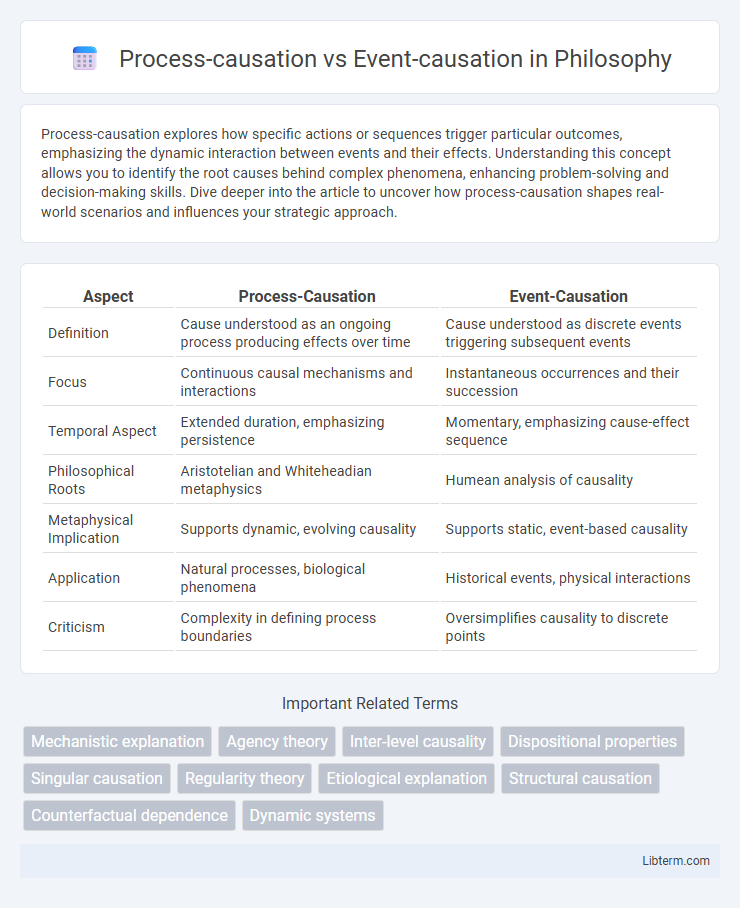Process-causation explores how specific actions or sequences trigger particular outcomes, emphasizing the dynamic interaction between events and their effects. Understanding this concept allows you to identify the root causes behind complex phenomena, enhancing problem-solving and decision-making skills. Dive deeper into the article to uncover how process-causation shapes real-world scenarios and influences your strategic approach.
Table of Comparison
| Aspect | Process-Causation | Event-Causation |
|---|---|---|
| Definition | Cause understood as an ongoing process producing effects over time | Cause understood as discrete events triggering subsequent events |
| Focus | Continuous causal mechanisms and interactions | Instantaneous occurrences and their succession |
| Temporal Aspect | Extended duration, emphasizing persistence | Momentary, emphasizing cause-effect sequence |
| Philosophical Roots | Aristotelian and Whiteheadian metaphysics | Humean analysis of causality |
| Metaphysical Implication | Supports dynamic, evolving causality | Supports static, event-based causality |
| Application | Natural processes, biological phenomena | Historical events, physical interactions |
| Criticism | Complexity in defining process boundaries | Oversimplifies causality to discrete points |
Understanding Causation: Process vs Event
Process-causation emphasizes ongoing mechanisms and interactions that generate effects over time, highlighting the continuity and complexity of causative factors. Event-causation focuses on discrete, identifiable incidents that directly trigger outcomes, often simplifying causation into clear cause-and-effect pairs. Understanding causation requires recognizing how these perspectives complement each other, with process-causation providing depth to the temporal unfolding of causes and event-causation offering precise causal points for analysis.
Defining Process-Causation
Process-causation refers to the causal relationship established through ongoing processes or continuous interactions that bring about an effect, emphasizing the temporal and mechanistic connection between cause and effect. Unlike event-causation, which links discrete occurrences, process-causation highlights the sustained activities or conditions that generate outcomes over time. This concept is fundamental in fields like philosophy of science and law, where understanding the nature of causal chains informs explanations and interventions.
Defining Event-Causation
Event-causation refers to the relationship where specific events directly bring about other events in a causal chain, emphasizing discrete occurrences rather than continuous processes. This concept highlights how particular incidents serve as triggers, causing subsequent effects at distinct points in time. Event-causation contrasts with process-causation by focusing on identifiable events as causes rather than ongoing processes or conditions.
Key Differences Between Process and Event Causation
Process-causation refers to a continuous series of linked occurrences that collectively cause an effect, whereas event-causation involves discrete, singular incidents directly resulting in an outcome. Key differences include temporal continuity--process-causation spans over time with multiple connected actions, while event-causation is usually instantaneous or limited to a specific moment. Liability in legal contexts also differs; process-causation often spreads responsibility across ongoing conduct, whereas event-causation assigns it to a particular event or act.
Philosophical Foundations of Causation
Process-causation emphasizes the continuous physical processes linking cause and effect, highlighting mechanisms such as energy transfer and sustained causal interactions, which align with Judea Pearl's structural causal models. Event-causation, rooted in Humean philosophy, treats causes and effects as discrete occurrences correlated through constant conjunction, often critiqued for relying on regularity without necessary connection. Philosophical foundations of causation increasingly integrate both approaches to address metaphysical questions of causal realism and agency in complex systems.
Examples of Process-Causation in Science
Process-causation in science often involves continuous or extended mechanisms, such as the gradual erosion of rocks by water flow leading to sediment formation. Another example is the biological process of photosynthesis, where a sequence of chemical reactions converts sunlight into energy in plants. Unlike event-causation, which focuses on discrete occurrences, process-causation emphasizes ongoing interactions that cumulatively cause change over time.
Examples of Event-Causation in Science
Event-causation in science is exemplified by the triggering of a chemical reaction when a catalyst is introduced, such as the rapid decomposition of hydrogen peroxide upon adding manganese dioxide. Another example is the initiation of an avalanche caused by a sudden snowstorm or seismic activity, where a specific event directly precipitates the outcome. In neuroscience, the generation of an action potential in a neuron following a stimulus demonstrates event-causation as a discrete event leading to subsequent biological effects.
Implications of Causation Types in Scientific Research
Process-causation emphasizes continuous mechanisms and interactions over time, providing a detailed understanding of how effects emerge from dynamic systems in scientific research. Event-causation focuses on discrete occurrences or trigger events, allowing for identification of specific causes linked to particular outcomes, crucial for experimental design and causal inference. Recognizing the distinction impacts methodological approaches, data interpretation, and the development of interventions across disciplines such as biology, physics, and social sciences.
Process-Causation and Event-Causation in Everyday Reasoning
Process-causation emphasizes the continuous mechanisms and interactions that lead to an outcome, highlighting how ongoing activities influence changes over time. Event-causation concentrates on discrete occurrences triggering specific effects, focusing on isolated incidents as causal agents in everyday reasoning. Understanding the interplay between process-causation and event-causation helps clarify how people interpret cause-and-effect relationships in daily life, where both gradual developments and sudden events shape explanations.
Debates and Future Directions in Causation Studies
Process-causation emphasizes the continuous causal mechanisms linking cause and effect, while event-causation centers on discrete occurrences triggering outcomes, sparking debates over their explanatory scope in philosophy and science. Critics argue process-causation better captures dynamic, ongoing interactions, whereas event-causation suits straightforward temporal sequences, prompting calls for integrative models. Future directions include combining process-event frameworks with advances in causal modeling and computational methods to enhance predictive accuracy and explanatory power in complex causal systems.
Process-causation Infographic

 libterm.com
libterm.com